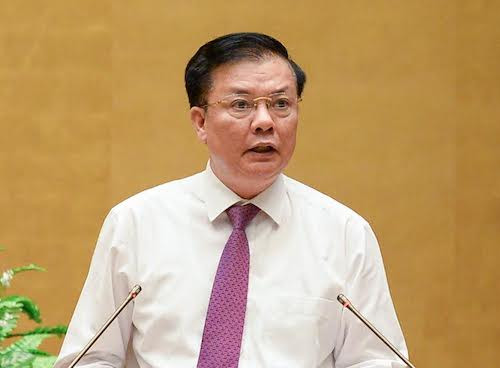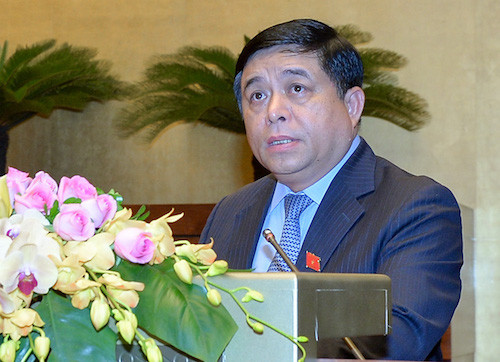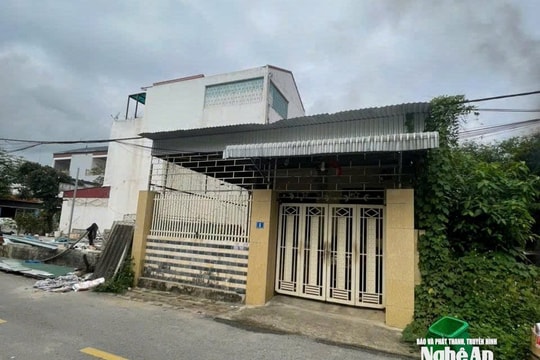Minister of Finance: In 15 years, public debt has increased nearly 15 times
Minister Dinh Tien Dung said that the comment "public debt is increasing rapidly, debt repayment pressure is great" at this time is completely correct.
The above viewpoint was given by the Minister who plays the role of "national treasurer" when the National Assembly discussed this morning the mobilization and use of loans and public debt in the 2016-2020 period, and reassessed the results of 2011-2015. Commenting that the pressure to repay debt is currently very large, Mr.Dinh Tien Dung said that this is an important issue that requires consensus in social awareness.
 |
Minister of Finance Dinh Tien Dung. |
NThe head of the financial sector gave figures showing that the relative ratio of public debt has increased from 36.5% of GDP in 2001 to more than one and a half times -62.2% of GDP in 2015. In terms of scale, the figure in 2015 reached 2.68 million billion VND, 2.3 times higher than in 2010 and 14.8 times higher than in 2001.
“The growth rate of public debt over the past five years has been about 18.4%, three times higher than the economic growth of 5.91%,” said the Minister of Finance, adding that part of the reason is that economic growth in recent years has not met the set plan, leading to an increasing debt-to-GDP ratio.The next reason is that the restructuring of public investment, state-owned enterprises, and banks did not meet requirements, while the budget revenue decreased due to oil prices and to serve the goal of promoting production.
According to Mr. Dung, every year, the Government still has to roll over a large amount of debt: 106,000 billion in 2014, 125,000 billion in 2015, and by the end of October 2016, about 95,000 billion VND.Meanwhile, the spending level still follows the annual economic growth rate approved by the National Assembly (spending to ensure social security spending, excluding salaries, increases by 18% per year, higher than revenue increase), causing the structure of regular spending in the budget to increase rapidly, up to 67.8% of total revenue (up 8% compared to the previous period).
The deficit ratio is also high. In the 2011-2015 period, the budget deficit was estimated at VND872,000 billion, but the actual implementation was VND1,020,000 billion. “The absolute public debt has increased to VND1,200,000 billion,” the Finance Minister stated.
The solution to limit the growth rate of public debt proposed by the Government representative is to continue to improve the public debt management and budget institutions, submit to the National Assembly amendments to the Law on Public Debt Management... The management agency also implementsRestructure public debt by promoting debt ratio restructuring (domestic debt is currently 57% and foreign debt is 43%); restructure term and interest rate of public debt.
Minister Dung said that the public debt maturity has nearly doubled, while interest rates have nearly halved, partly due to the difficult domestic financial situation. “But achieving this is also very good,” he said.
 |
Minister of Planning and Investment - Nguyen Chi Dung. |
Regarding the medium-term public investment plan for the 2016-2020 period, Minister of Planning and Investment Nguyen Chi Dung said there are two views: on the one hand, we should focus on investing in a number of “locomotive” sectors, fields, and localities to create spillovers and increasingly contribute to revenue; on the other hand, we need to pay attention to disadvantaged localities to narrow the development gap. “Meanwhile, budget resources are limited,” said Mr. Dung.
"Should tax houses"
Delegate Pham Phu Quoc said that inIn the context of a limited budget, Vietnam's revenue depends largely on resources, and spending needs are high. The Government has no other choice but to nurture, find new sources of revenue, and reduce spending.
“The government must find ways to unleash social resources, so that businesses and people can boldly participate in capital investment, instead of saving money or keeping it in a safe,” delegate Pham Phu Quoc emphasized.
The Ho Chi Minh City delegate also said that, in addition to the start-up program being promoted by the Government, it is also necessary to encourage the establishment of national brand corporations with revenue and profits greater than the national GDP. According to Mr. Quoc, these large enterprises will lead the domestic business community to develop, creating revenue for the budget.
Improving revenue sources also requires considering new taxes, such as housing taxes. Mr. Quoc gave an example: when the budget invests in infrastructure, housing prices in these areas increase, investors must also be responsible for sharing profits, paying a portion of the profits to the budget to get money to reinvest in other infrastructure projects...“The budget must be a source of seed capital, creating motivation and leverage for development,” Mr. Quoc said.
In addition, he noted that attracting ODA capital requires vigilance to avoid falling into a debt trap, and attracting FDI also requires selection to avoid paying environmental prices later. Local authorities also need to tighten discipline, budget finance, and eliminate asking and granting...
Suggesting ideas to create revenue for the budget, Standing Member of the Finance and Budget CommitteeTran Quang Chieu said that currently, the authorities are still "leaving some important sources of revenue empty", which need to be carefully considered in the coming time, such as:Revenue from gas sales of Vietnam Oil and Gas Group;The formation of special funds in state-owned enterprises, the use of accumulation funds to repay debt...
According to VNE
| RELATED NEWS |
|---|

.jpg)






